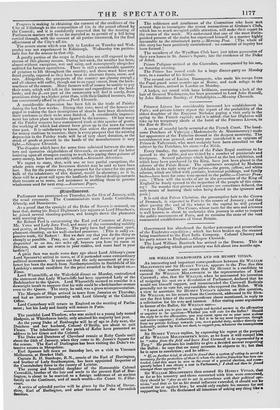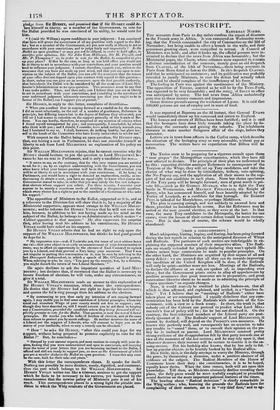SIR WILLIAM MOLESWORTH AND SIR HUSSEY VIVIAN.
An interesting and important correspondence between Sir WILLIAM MOLESWORTII and Sir HUSSEY VIVIAN, appears in the True Sun this evening. Our readers are aware that Sir Hussev is a candidate to succeed Sir WILLIAM MOLESWORTII in the representation of East
Cornwall ; also, that Sir WILLIAM, when he announced his intention of resigning his seat on a dissolution of Parliament, declared that he would not himself support, and recommended the Cornwall Radicals
generally not to vote for, any candidate who opposed the Ballot. With a view to ascertain Sir HUSSEY VivIAN's opinion on this question, Sir WILLIAM, on his return from the Continent, addressed to Sir Hms- SEY the first letter of the correspondence above mentioned, in reply to a solicitation for his vote and interest. After stating some arguments in favour of the Ballot, Sir WILLIAM says— .14 I must ask you to give me a simple and decided answer in the affirmative or negative to he question—Whether you will rote for the Ballot? Should the reply be in the affirmative, you may count upon me as your most zealous and active supporter ; if otherwise, I feel it to be my most imperious, though from my private feelings towards you, mot painful duty, neither directly nor indirectly, neither by wish nor deed, to support you, whatever the consequences may be." Sir HUSSEY VIVIAN replies, by expressing his regret at the purport of Sir WILLIAM MOLESWORTH'S letter, as he fears it will compel hint to "retire from the field and leave East Cornwall to be represented b,, a Tory." He professes his inability to give a decided answer respecting the Ballot : be says that on many accounts be objects to it ; but that he is open to conviction ; and be adds- " If, on further trial, it should be found that a system of voting in secret is necessary for the protection of those to whom the elective franchise has been es- tended, (and this must be seen in the event of a general election, and conse- quently before I can obtain a seat in Parliament,) I shall not then be found amongst those opposing it." Sir WILLIAM MOLESWORTII then assured Sir HUSSEY VIVIAN, that as far as his tenantry and those connected with him were concerned, they should be "free as air to act in accordance with their political opi- nions," and that as far as his moral influence extended, it should not be exerted for or against him ; he would only explain his reasons for not supporting him. lie disclaimed all intention of asking any thing like a
pledge from Sir HUSSEY, and promised that if Sir HUSSEY could de- lase himself at liberty. as a member of the Government, to vote fur the Ballot provided he was convinced of its utility, he would vote for him.
" I (said Sir William) repose confidence in your judgment : I am convinced that facts will prove the correctness of all my positions with regard to the Bal- lot ; but as a member of the Government, are you now really at liberty to act in accordance with your convictions, and to judge fairly and impartially ? Is the Ballot an open question ? or may you not be obliged, in order to hold office, to sacrifice your opinions, like Sir .john Cam Hobhouse, Sir H. Parnell, and Mr. P. Thompson ? or, in order to vote for the Ballot, be compelled to give sip your place? If this be the case, so long as you hold office you would not be at liberty to act in accordance with your convictions, and your position would tend to influence your judgment. I cannot, therefore, support you, unless to the assurance that you have not made up your mind, and that you are open to con- viction on the subject of the Ballot, you can add the assurance that the tenure of your office does not depend upon your conduct with regard to this question— in short, unless you can give me an assurance, upon the best possible authority, that henceforth de Ballot is to be considered by all the mini'icre of Lord Mel- bourne's Administration as an open question. This assurance must be one that / can make public. Then, and then only, can I believe that you are at liberty to act in accordance with your convictions, and (confiding in the soundness of your unfettered judgment ultimately convincing you that you ought to be in favour of the Ballot) can I support you at present."
Sir HUSSEY, in reply to this letter, complains of desertion-
" When you recollect that in coming forward as a candidate for the county, I did so most reluctantly, on the call of a number of gentlemen, Reformers in principle, but differing somewhat in the degree of Reform they advocated, you will see I had reason to calculate on the support generally of the friends of Re- form. You can hardly, therefore, be surprised at my mention of retiring when I found myself unsupported by you ; and consequently, I concluded, by others who think with you ; and I should, I consider, have acted unfairly towards you, bad I hesitated to say so. I shall, however, do nothing hastily, but place my- self in the hands of the Committee who have kindly undertaken to act for me."
With respect to the Ballot being an open question, Sir HUSSEY says, that, not having a seat in Parliament, be does not consider himself at liberty to ask from Lord MELBOURNE an explanation of his policy on this point.
Sir WILLIAM MOLESWORTI1 rejoins, that he cannot conceive why Sir HUSSEY should hesitate to put the question to Lord MELBOURNE be- cause he has no seat in Parliament, and is only a candidate for one.- " It seems to me, on the contrary, that for this very reason you are entitled to ask for it ; as, by an explicit understanding with the Government, you can alone know what your future position will be in the House, and whether you will be at liberty to act in accordance with your convictions. If, by beiw; in Parliament, you would have a right to demand an explanation, surely, as en- deavouring to obtain a seat, you have an equal right to know what course the Government intend to take, in order that you may satisfy the free and indepen- dent electors whose support you solicit. For these reasons, I consider your answer to be merely a courteous mode of avoiding a disagreeable question, which every elector has a right to put to the member of a Government who asks his support."
The opposition of Ministers to the Ballot, supported as it is, and as a reference to the Division-list will show that it is, by a majority of the Ministerial supporters, appears most strange to Sir Wirriast MOLES- WORTH; and he informs Sir HUSSEY Vivtats that he will not vote for him, because, in addition to his not having made up his mind on the subject of the Ballot, be belongs to anAdministration which makes "a Cabinet opposition to that measure." lie also expresses his surprise that, after having read his address to his constituents, Sir HUSSEY VIVIAN could have relied on his support.
Sir HUSSEY VIVIAN admits that he had no right to rely upon the support of Sir WILLIAM Alortswowni, but thinks he had good ground to hope for it.
" My impression was—and, if I mistake not, tte tenor of your address heals me cut—that your object in so early an announcement of your determination to retire, was to afford an opportunity to the electors of East Cornwall to replace you by a Liberal, and thus prevent a Tory being your successor. That I was not singular in putting this construction on it, may be seen by referring to the last Devouport Independent, in which a speech of Mr. O'Connell is quoted. 'When, referring to you, he says, You gave up the county, lest, by a division, you might disturb the return of two Liberal Members.' " He again declines to ask the important question of Lord MEL- MOURNE ; but declares that, if convinced that the Ballot is necessary to insure freedom of election, he will vote, under any circumstances, to give it a trial. Sir WILLIAM Moreswoarn sends an answer to this explanation of Sir HUSSEY VIVIAN'S intention, which closes the correspondence. He denies that Sir HUSSEY had any right to hope for his assistance ; and quotes the foraying passage from his address to the electors.
46 By announcing to you thus early my intention of not coming forward again, I may enable you to find some candidate of Liberal principles, whom the timid and irresolute Whigs of your county would not fear to support ; and, though they have deserted us, still I would entreat you to aid them in keeping out a Conservative, provided the candidate whom they bring forward will ex- plicitly promise to rote for the Ballot. That question is now the test of Liberal principles. He mocks you who talks of freedom of election, and at the same time refuses to protect you by secret suffrage. He neither deserves the name of a Liberal nor the support of Liberals, who will consent to leave you at the mercy of your landlords, when so easy a remedy can be obtained."
" How " he asks Sir HUSSEY, "after this could you hope for my support, without being prepared to promise explicitly to vote for the Ballot ?" But, he concludes-
" Swayed by yaur earnest request, and most anxious to comply with your de- sires, finding that you were undetermined and open to conviction, and fancying from the tenor of your letters that you are becoming inclined to the Ballot, I offered and still am ready to support you, as soon as the Government of which you are a member declares the Ballot an open question. I trust this may 600B be the case, both for their sake and yours."
With this letter the correspondence closes. It speaks for itself. Nothing can possibly be more distinct, manly, dignified, and courteous, than the part which belongs to Sir WILLIAM AIOLESWORTH. Sir HUSSEY VIVIAN writes too like a trimmer, anxious to get the support which he feels to be necessary to his success, yet hampered by the consciousness that the unwise policy of Ministers puts it out of his reach. This correspondence places in a strong light the pitiable con- dition in which the Whig retainers of the Government are placed.



























 Previous page
Previous page